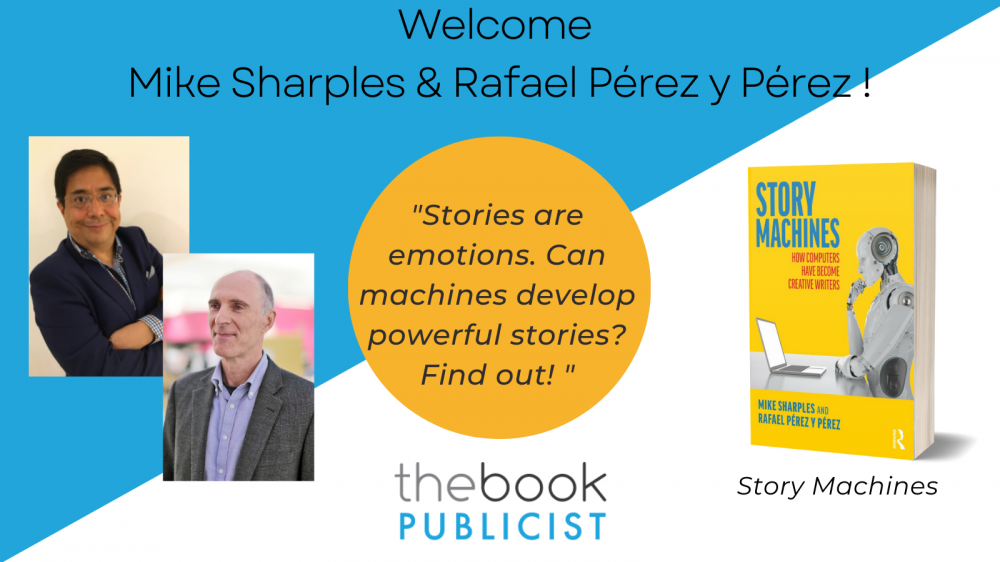We’re excited to be working on the campaign for Story Machines. We asked the authors, Mike Sharples and Rafael Pérez y Pérez our 5 questions to find out more about them, their book, and their vision:
1. Pitch in 10 - sell us your book in less than 10 words
Stories are emotions. Can machines develop powerful stories? Find out!
2. Audience of One - If you could choose ONE person to read your book who would it be and why?
That man reading in a subway car. Or that woman having a coffee in High Park while she flips through her book. In other words, an ordinary person (not an AI specialist) who realises the importance of society understanding what is behind these AI scientific and technological developments. In particular, those related to automatic story generation. This book is an open door to the past, present and future, that allows the reader to, in an easy way, explore and reflect on how humans have produced story machines. Knowledge is power.
3. Behind the Book - Who or what inspired you to write this book?
The book grew from a collaboration between Mike and Rafael at the University of Sussex. After completing a PhD on Cognition, Computers and Creative Writing, at Edinburgh University’s Department of Artificial Intelligence in 1984, Mike went to Sussex to lead research into AI and Creativity. He ran projects on AI story generation and supervised Rafael for his PhD on MEXICA: A Computer Model for Creativity in Writing. Rafael’s MEXICA program is the first software to implement a model of human creative writing. For the past 20 years Mike and Rafael had intended to write a book on computers as storytellers.
By 2020, a new generation of neural network AI programs was demonstrating scarily creative powers of storytelling. We decided to write a book, for a wide audience, to dig into the long history of machines as composers of poems and stories, reveal humans as storytelling machines, show the power and limitations of AI story generation, and speculate about how machines might tell stories of their life in the metaverse.
4. Guess what? Tell us one thing that readers might be surprised to hear about you.
Mike has a lifelong interest in empowering people of all ages through innovative technologies. He led a team of students, in collaboration with Kodak, to develop the world’s first multimedia smartphone to be demonstrated to the public – on BBC Tomorrow’s World in December 1999. You can see the BBC broadcast on YouTube at https://www.youtube.com/watch?v=0nAmCH2QSlw&t=246s. The device combined a multimedia tablet computer, digital camera, mobile phone, internet browser and pen handwriting recogniser. His other projects included helping children create video games (in 1979), testing an early forerunner to Zoom for tutoring at a distance (in 1982), developing a Writer’s Assistant with British Telecom (in 1989), and designing the FutureLearn platform for massive open online courses (in 2012).
Rafael loves to play his guitar, sing with his friends and compose songs. His father, who is also a composer, was the one who taught him to play the guitar. His aunt was a professional singer and you can admire a statue of her in one of the main plazas in México City. While studying for his PhD in the UK, Rafael, along with his Argentinian friend Sergio, sang at parties, pubs, and cultural events. There he experienced first-hand how human creativity is a wonderful tool for sharing life experiences and creating bridges between different cultures and ideologies (features so much needed nowadays). So, it's no surprise that when Mike was looking for a student to work on AI and creativity, he couldn't resist. He believes that story machines are useful tools to connect people.
5. The next chapter - what’s next for you?
AI storytelling has reached a fascinating stage. Computers can write compelling and engaging prose, for blogs, news media, advertising, education. But the programs don’t know what they have written. They have no way of reflecting on their output – to decide if it’s truthful or false, boring or engaging. They have no power to revise what they have written. AI neural networks can perform amazing feats with words, but they have no common sense knowledge of the world – they don’t know what makes a baby cry, or humans fall in love. At best, current commercial story generators are senseless and amoral, at worst dangerous.
Some researchers are calling for a new generation of AI that combines performing with mental reasoning. Will such programs be able to write great literature, or does truly creative writing need to come from a body and mind alive in the real world? To take the next big step, AI researchers, cognitive scientists and human storytellers will need to work together in understanding how the creative mind works, how to tell a good story, and how to design machines that write from experience. We hope to follow and contribute to that leap forward in machine creativity.
To get a review copy or to book in an interview, contact Jessica Jones at jessica.jones@thebookpublicist.co.uk

